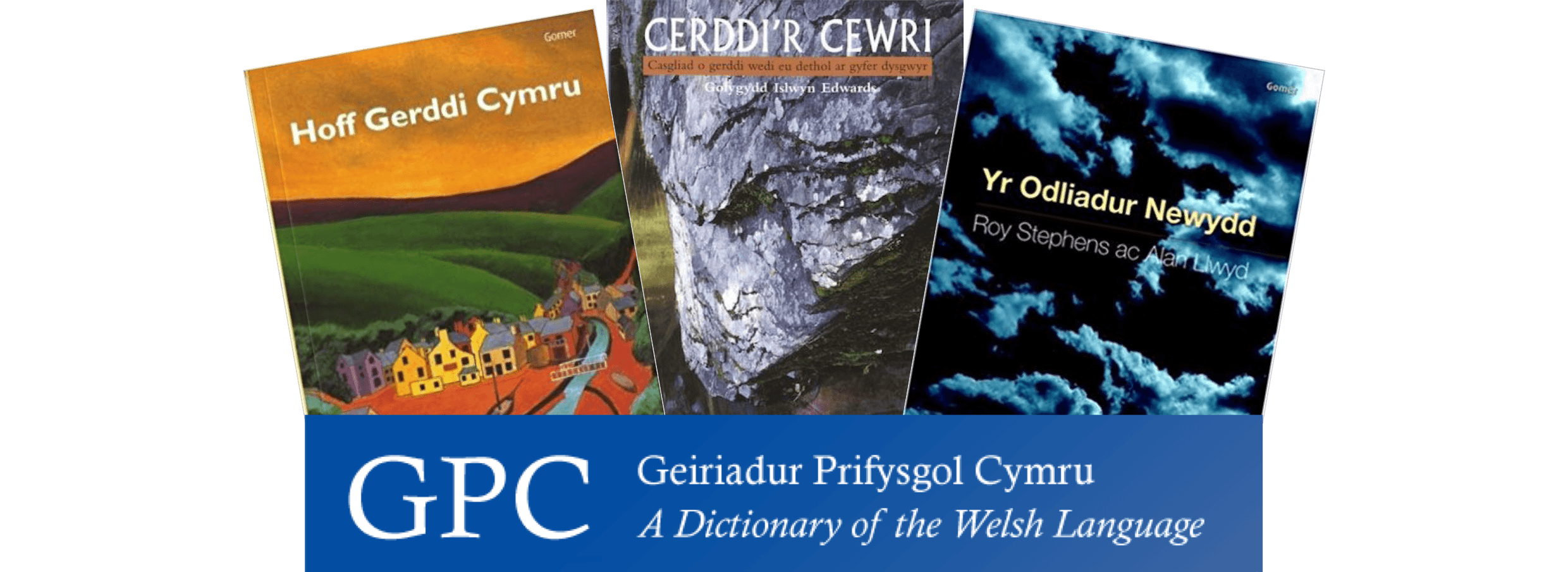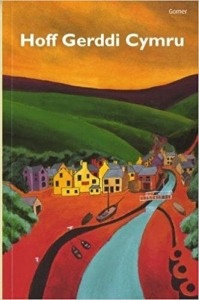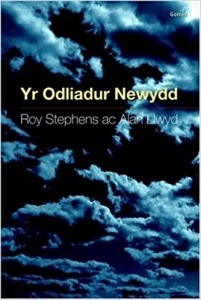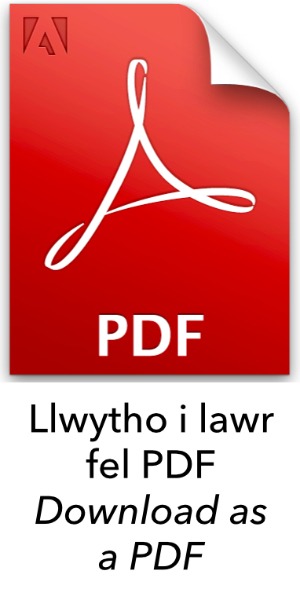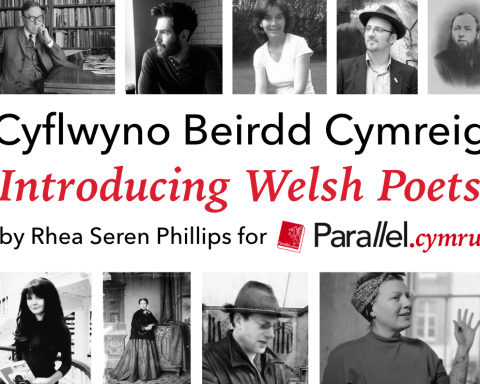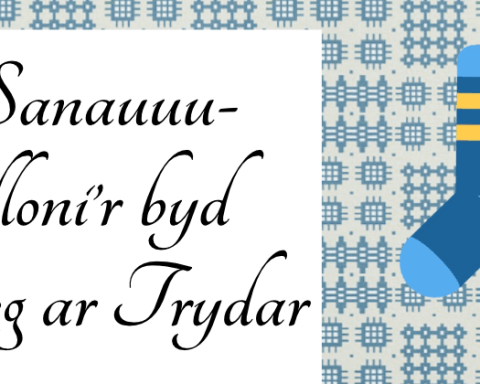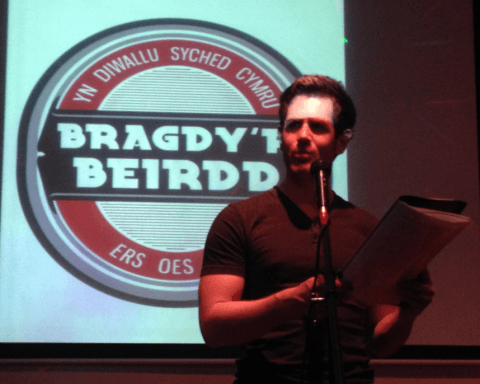Mae Patrick Jemmer wedi dod yn hyfedr yn yr iaith, ac wedi dechrau diddordeb yn farddoniaeth. Yma, mae e'n rhannu tipiau am bobl gyda diddordeb mewn ffurfio barddoniaeth, siarad am ei daith iaith a rhannu un gerdd bod e wedi ysgrifennu.
Patrick Jemmer has become proficient in Welsh, and has started an interest in poetry. Here, he share tips for people with an interest in exploring poetry, speaks about his language journey and shares a poem that he has written.
| Cefais i anrhydedd mawr pan enillodd fersiwn o’r gerdd hon y Gadair yn Eisteddfod y Dafarn y llynedd. Mae hon yn eisteddfod i ddysgwyr yn Nhŷ Tawe, Abertawe, wedi'i threfnu gan Fenter Iaith Abertawe a Dysgu Cymraeg Ardal Bae Abertawe bob blwyddyn. Roedd y neuadd dan ei sang, ac fe licwn i ddiolchi i bawb am y siawns i ddysgu ac i gymryd rhan, ac am yr hwyl i gyd. | I received a great honour when a version of this poem won the Chair in the Pub Eisteddfod last year. This is an eisteddfod for learners in Tŷ Tawe, Swansea, organised by Menter Iaith Abertawe and Learn Welsh Swansea Bay Region each year. The hall was packed full, and I’d like to thank everyone for the chance to learn and to take part, and for all the fun. |
| Nid oes llawer o farddoniaeth yn y cyrsiau Cymraeg i Oedolion, wrth reswm. Mae ychydig ohoni yn y Cwrs Uwch, ond pwyslais y cyrsiau yw cyfathrebu’n hyderus. Felly, rhois dro ar greu cerdd ar fy liwt fy hunan. Wedi’r cwbl, “trwy fethu daw dysgu,” rywsut neu’i gilydd, on’ wna? | There is not a lot of poetry in the Welsh for Adults Courses, of course. There is a little of it in the Advanced Course, but the emphasis of the courses is on communicating confidently. So, I set my mind to writing a poem under my own steam. After all, 'through failing one learns,' one way or another, doesn’t one? |
| Nawr ‘te, un peth yw Saesneg, ond peth llwyr wahanol yw’r Gymraeg (mewn ffordd o siarad, ac yn llythrennol). Oherwydd hynny, cyn i fi ddechrau hyd yn oed feddwl am ysgrifennu cerdd, fe ddarllenais yn ddi-baid er mwyn cychwyn ar ddysgu’r grefft. I ddechrau, fe fyddwn i’n awgrymu’r llyfrau Fesul Gair: Blodeugerdd Barddoniaeth; Cerddi'r Cewri; a Hoff Gerddi Cymru. Fe fyddwn yn argymell eich bod chi’n darllen yn uchel er mwyn clywed y seiniau oll, a theimlo’r rhythmau i gyd. Rwy’n dwlu ar Talwrn y Beirdd ar Radio Cymru hefyd, ond nid ydwyf yn deall hanner y rhaglen hon! Hefyd mae’n bosibl cael hyd i rai cerddi Cymraeg ar YouTube. | Now then, English is one thing, but Welsh is something totally different (in a manner of speaking, and literally). Because of that, before I started even thinking about writing a poem, I read ceaselessly in order to begin learning the craft. To start with, I would suggest the books Fesul Gair: Blodeugerdd Barddoniaeth; Cerddi'r Cewri; a Hoff Gerddi Cymru. I would recommend that you read out loud in order to hear all the sounds, and feel all the rhythms. I love Talwrn y Beirdd on Radio Cymru too, but I don’t understand half of this programme! Also, it’s possible to find some Welsh poems on YouTube. |
| Beth bynnag, fe ddymunwn greu rhywbeth eithaf ffurfiol ei naws wrth sôn am taith bywyd. Felly, nes i roi fy mryd ar ysgrifennu cerdd ar ffurf soned, sydd yn fesur poblogaidd (Esboniad BBC Bitesize). Dewisais hon yn hytrach na chaniad penrhydd, neu gerdd rydd, hynny yw cerdd yn y mesur rhydd neu ddi-odl, heb fydr gosodedig. Cerdd o bedair llinell ar ddeg yw soned ac mae deg sillaf ymhob llinell. Fel arfer y defnyddir mesur pumban iambig gyda phatrwm pwyslais “da DA / da DA / da DA / da DA / da DA.” Yn aml mae soned wedi’i rhannu’n ddwy adran, yr wythawd (yr wyth llinell gyntaf) a’r chwechawd (y chwe llinell olaf). Mae naws neu gyfeiriad y gerdd yn newid yn rheolaidd ar ôl y volta (noe’r “tro”) rhwng y ddwy ran. | Anyway, I wanted to create something quite formal in atmosphere whilst talking about 'life’s journey'. So, I set my mind to writing a poem in the form of a sonnet, which is a popular metrical form (BBC Bitesize explanation). I chose this rather than caniad benrhydd [a poem in free metre, without cynghanedd, or blank verse], or cerdd rydd [a poem in free metre, vers libre]- that is a poem in the free or unrhymed metrical form, without prescribed metre. The sonnet is a poem of 14 lines, and there are 10 syllables in each line. Usually, the iambic pentameter metrical form is used with the stress-pattern “du DUM / du DUM / du DUM / du DUM / du DUM.” Often the sonnet is divided into two sections, the octet (the first eight lines), and the sestet (the last six lines). The feeling or direction of the poem changes after the volta (or the turn) between the two parts. |
| Mae i soned nifer o batrymau odli penodol, ond nid oes cynghanedd ynddi. Mae cynghanedd (yn ôl Geiriadur Prifysgol Cymru), yn gyfundrefn o gyseinedd neu gyflythreniad rhwng cytseiniaid (a’r llafariaid yn amrywio) mewn llinell o farddoniaeth gaeth Gymraeg ynghyd ag odli mewnol (yn y sain a’r lusg) ac acennu cytbwys. Y math mwyaf poblogaidd o soned yw'r Soned Shakespearaidd, sy’n dilyn patrwm odli “A B A B / C Ch C Ch / D Dd D Dd / E E” (gweler Sonnet 116 gan Shakespeare, er enghraifft). Mae’r sonedau Y Llwynog gan Robert Williams Parry (1884 – 1956), Tŷ’r Ysgol gan Thomas Herbert Parry-Williams (1887 – 1975), ac Ofn gan Hywel Griffiths (ganwyd 1983) yn enghreifftiau enwog ar y ffurf hon. Dewisais i ddefnyddio ffurf arall o soned, sef Soned Betrarcaidd (neu soned Italaidd), sy’n dilyn patrwm odli “A B B A / A B B A / C Ch Ch C / D D” (gweler Death, Be Not Proud gan John Donne, er enghraifft). | A sonnet has a number of definite rhyme-schemes, but there is no cynghanedd. Cynghanedd, according to Geiriadur Prifysgol Cymru, is a system of consonance or alliteration in a line of Welsh poetry in strict metre and internal rhyming (in cynghanedd sain and cynghanedd lusg). The most popular type of sonnet is the Shakespearian Sonnet which follows the rhyme-patterns “A B A B / C D C D / E F E F / G G” (see Sonnet 116 by Shakespeare, for example). The sonnets Y Llwynog [“The Fox”] by Robert Williams Parry (1884 – 1956), Tŷ’r Ysgol [“The Schoolhouse”] by Thomas Herbert Parry-Williams (1887 – 1975), ac Ofn [“Fear”] by Hywel Griffiths (born 1983) are famous examples of this. I chose to use another form of sonnet, namely the Petrarchan Sonnet (or “Italian Sonnet”), which follows the rhyme-scheme “A B B A / A B B A / C D D C / E E” (see Death, Be Not Proud by John Donne, for instance). |
| Dyma gyfieithiad eithaf llythrennol o’r gerdd: “What thing is life but some kind of journey, / Which leads us from pillar to post without need of a map; / Until we find the end – wallop – / Lost, amidst the sands of an extensive wasteland, // Where mocking winds confuse our futile language, / While we wander in anguish, as if by accident / We could avoid each unexpected trap; / And be judged by a forgiving jury? // We mourn, therefore, old Adam’s path with a cry, / From the moment of our conception in the womb, / To the day of our death in the jaws of the gaping Earth; / At the end of the test, will we reach Heaven’s vault? // And there, with those blessed ones, / Shall we dare to stroll the narrow path still?” Un sylw sy’n berthnasol yma: fe wnes i gyfansoddi’r soned yn y Gymraeg, ac rwy hefyd wedi cyfieithu’r darn i’r Saesneg gan geisio cadw’r naws a’r rhythm, felly nid fersiwn hollol lythrennol ydy’r cyfieithiad arall hwnnw. | Here is quite a literal translation of my poem: “What thing is life but some kind of journey, / Which leads us from pillar to post without need of a map; / Until we find the end – wallop – / Lost, amidst the sands of an extensive wasteland, // Where mocking winds confuse our futile language, / While we wander in anguish, as if by accident / We could avoid each unexpected trap; / And be judged by a forgiving jury? // We mourn, therefore, old Adam’s path with a cry, / From the moment of our conception in the womb, / To the day of our death in the jaws of the gaping Earth; / At the end of the test, will we reach Heaven’s vault? // And there, with those blessed ones, / Shall we dare to stroll the narrow path still?” One comment which is relevant here: I composed the sonnet in Welsh, and I have also translated the piece into English trying to keep the mood and the rhythm, so that other translation is not a totally literal version. |
| Beth oedd yn anodd i fi wrth ysgrifennu’r gerdd? Wel, siaradwr ail-iaith ydw i, ac felly nid yw fy ngeirfa’n helaeth, yn enwedig o ran geiriau sy’n odli gyda’n gilydd. Fe ddefnyddiwn Yr Odliadur Ar-lein, ac Yr Odliadur Newydd. Ar sawl achlysur yr oedd rhaid i fi droi’r drefn arferol o enw + ansoddair o chwith, er mwyn cadw’r rhythm a’r odl at ei gilydd (er enghraifft, eang baith, ofer iaith, annisgwyl drap, faddeugar raith). Ymhellach, dyna’r broblem o sut mae dewis geirfa briodol i’r pwnc ac i naws y darn heb fod yn hynafol, ac wrth gadw at iaith sy’n fyw. Efallai y bydd rhannau’r gerdd yn swnio'n rhyfedd i'r glust gyfarwydd: rhaid i fi ymarfer mwy a gwrando ar fwy o farddoniaeth! | What was difficult whilst writing the poem? Well, I’m a second-language speaker, and so my vocabulary is not extensive, especially when it comes to words that rhyme with each other. I used Yr Odliadur online, and Yr Odliadur Newydd. On several occasions I had to invert the normal order of noun + adjective to keep the rhythm and the rhyme together (for example, eang baith, ofer iaith, annisgwyl drap, faddeugar raith [extensive wasteland, futile language, unexpected trap, forgiving jury]). Further, there’s the problem of how to choose vocabulary appropriate to the topic and to the atmosphere without being archaic, and while keeping to living language. Perhaps parts of the poem will sound strange to the accustomed ear: I must practise more and listen to more poetry! |
| Rwy wedi bod wrth fy modd ond ar yr un pryd yn dra ymwybodol o’r anrhydedd a roed i fi, wrth gadw’r Gadair gain yn f’astudfa gartre drwy’r flwyddyn ddiwethaf. Yn olaf oll: nid ydwyf yn ymhonni'n fardd o ganlyniad i hyn i gyd -- Y Nef a’n gwaredo ni! Fe fwynhaf yn fawr ddefnyddio’r iaith, ac mae darllen a sgrifennu barddoniaeth yn y Gymraeg wedi dod yn beth bwysig i fi yn ddiweddar. Fe gadwaf ati o hyn ymlaen – llwyddo dryw ymarfer cyson a dyfalbarhad fydd yr arwyddair. Gobeithiaf y byddaf yn gwella o dipyn i beth, gan ddathlu tafod yr angylion tra gwnaf fi felly. Beth fydd ar ben y daith? ‘Dwn i’m, ond efallai rywbryd yn y dyfodol, sgrifennaf gerdd dra chryf! | I have been delighted but at the same time very mindful of the honour which has been bestowed on me, whilst keeping the fine Chair in my study at home throughout the last year. And last of all: I don’t claim to be a bard as a result of all this – Heaven forbid! I enjoy very much using the language, and reading and writing poetry in Welsh has become an important thing to me recently. I’ll keep at it from now on – succeeding through constant and persistent practice will be the watch-word. I hope I shall improve little by little, whilst celebrating the tongue of the angels as I do so. What will there be at journey’s end? I don’t know, but perhaps sometime in the future I shall write a really strong poem! |
Mae'r Geiriadur Prifysgol Cyrmu ar gael ar-lein, ac mae'r llyfrau dilynol ar gael o Gomer.
The Geiriadur Prifysgol Cymru is available online, and the the following books are available from Gomer.

